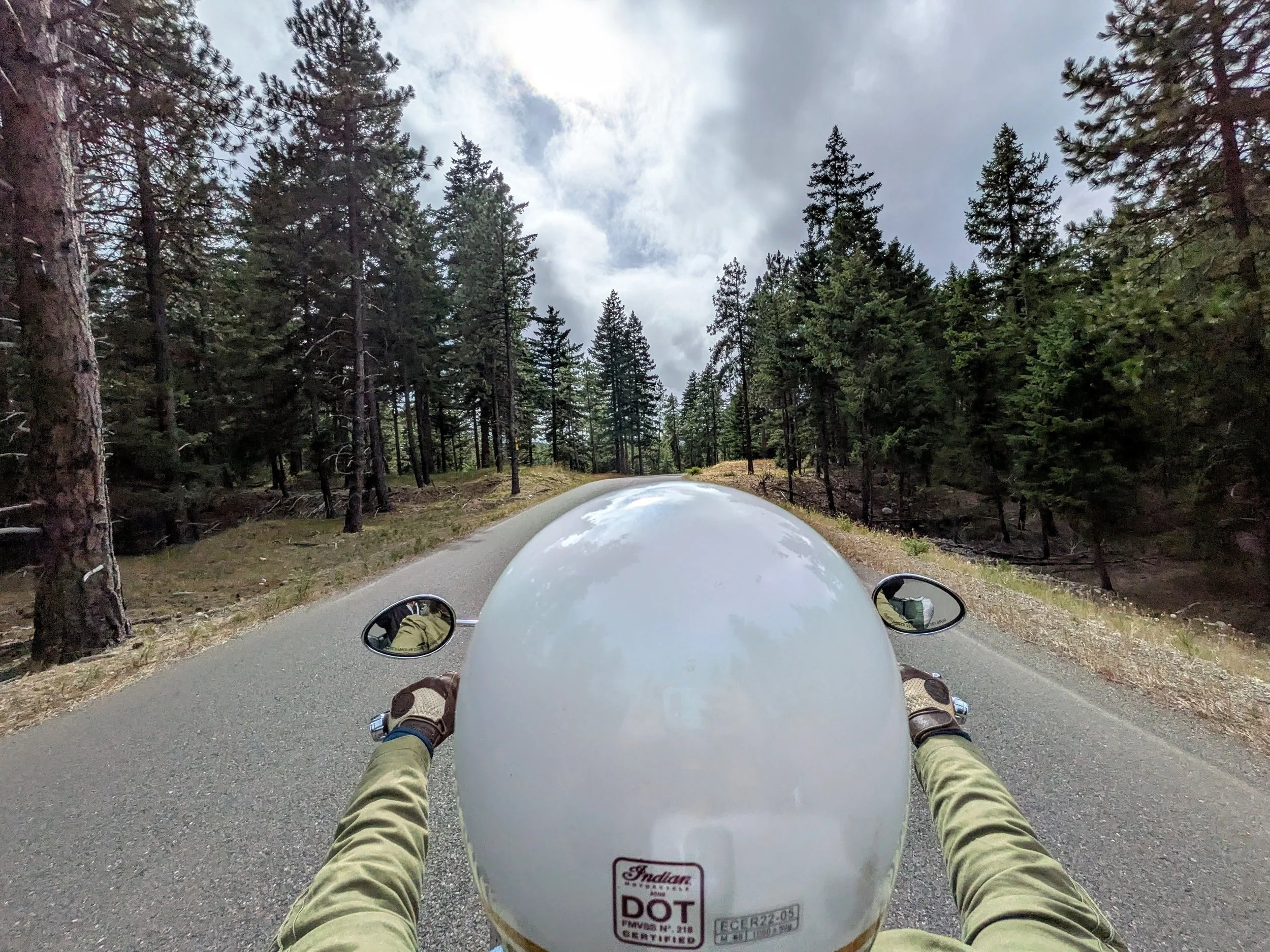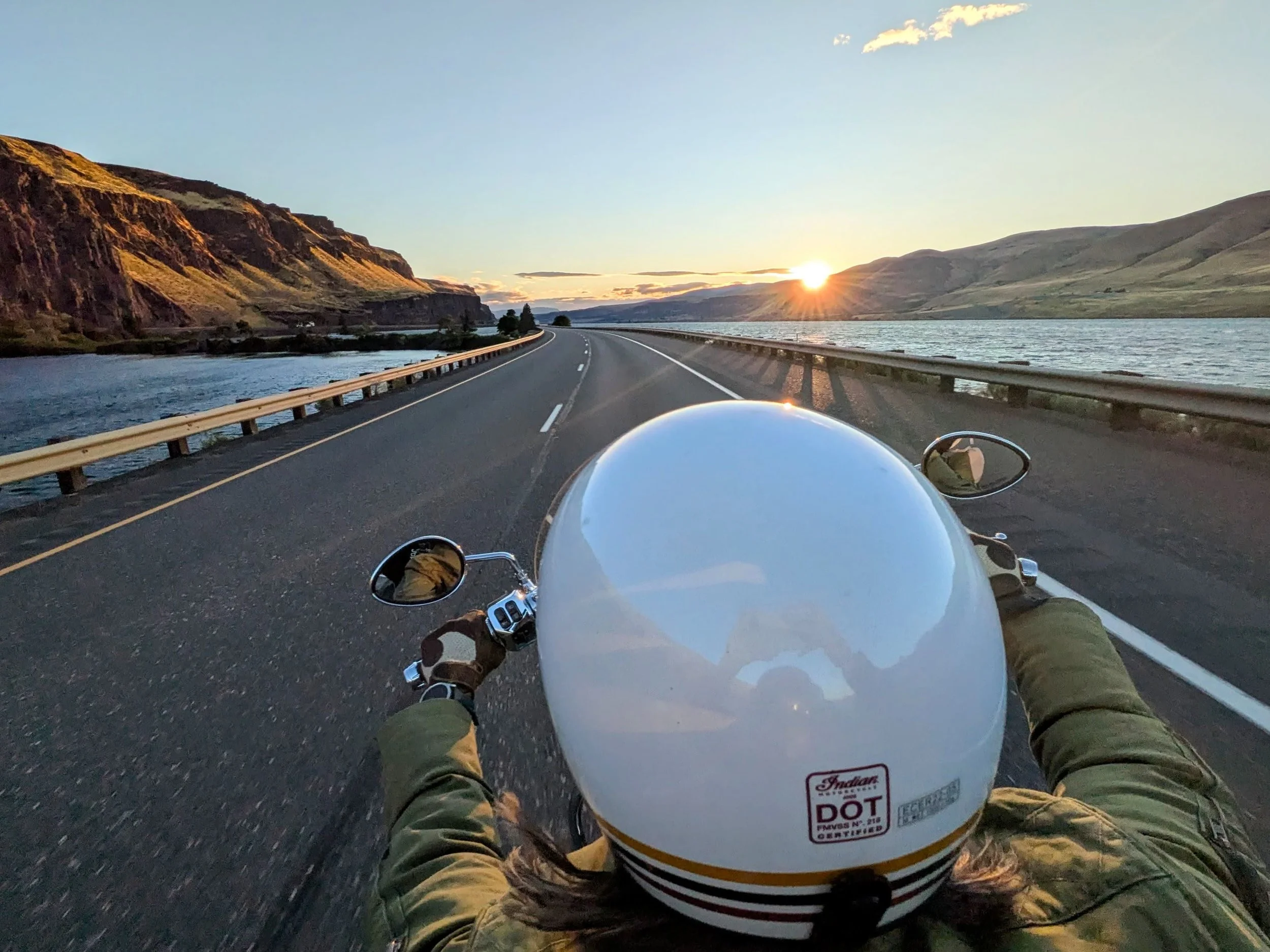Home is Where Your Nuclear Onions Are
July 9, 2025… We slept at the Rugged Country Lodge in Pendleton, Oregon. It was neither rugged, nor located in the country. It wasn't really a lodge either. A more accurate name would be "Utilitarian, Overpriced Motel Near Hamburger Joint and Town Fire Department." But I see why they called it something different. The swamp cooler generated pleasant white noise and I dreamed of Fern Gully, which surprised me because I've never seen it.
We flee Pendleton this morning on small, deserted roads that sigh heavily into oceanic expanses of dirt and dust that look like fallow fields taking the century off from getting up in the morning and brushing their teeth. But farmers seem to start to care more the further west we meander. A neat home nestles into a green burst of tall, leafy trees every five or ten miles. The empty, looping highway twists past and I drop a gear to slow down and inhale the smell of wood and creek water and roosters and gravel.
I love the smell of wheat in the morning.
Onions are an affront to civilization. I believe this deeply. They stink and they make people cry and we still invite them into our homes and treat them like family members, which, admittedly, makes onions a lot like most actual, human family members. Quibbling aside though, I think onions are instruments of psychological warfare created by British operatives during the War of 1812. I know what you’re thinking: onions have been around for thousands of years. Look, man. I don’t need your negative energy.
But.
When they are still in the ground, onions smell earthy and pungent. Less the bayonet-charge odor of plucked onions, which runs you through and leaves you for dead, and more a scent that evokes rich loam and summer sky and Dances With Wolves (I think that guy grew onions). As Oregon State Highway 37 wriggles out from the shallow furrows of sage brushed hills that stretch from Helix to Holdman (both towns' footprints cover less square mileage than a Ford F-350), it overlooks the Columbia River rolling wide and deep and purple from the north, and it traces the edges of these magnificent onion farms. It's strange, I think, that despite having little to no actual experience with onion farms I instinctively know that I'm smelling onion farms, and that I also instinctively like this smell. It's also strange that I have so much to say about onions, but I make no apologies. Onions have layers and I think some of them probably like to be talked about in encouraging tones.
Richland, Washington is one of the "Tri Cities." The other two are Pasco and Kennewick. I don't know anything about Pasco except that it sounds like the most hillbilly of the three towns. Kennewick is unremarkable except that it used to have a waterpark. Once or twice on my little kid birthdays we drove the three hours from my hometown in Oregon to play on the slides. In my memory this waterpark is gigantic, the slides adrenaline-slicked and absolutely murderous. In the real world, the waterpark was probably diminutive, the slides mostly made of fiberglass and generally sloped downward. The park isn't there anymore, but now they've got a weed store, so, progress.
Cascade Mountains.
The westernmost of the Tri Cities is Richland. It's borderline bourgious these days, with lots of electric cars and people in lycra riding expensive bicycles, and it's also home to the Hanford nuclear site, which produced the lion's share of America's nuclear material from World War II through the end of the Cold War. Hanford no longer produces nuclear power, instead focusing entirely on cleaining up contamination it caused due to poor storage and handling practices back in the 60s and 70s. My dad lived near the Hanford site when he was a kid, and this fact makes me glow with pride.
It's not yet 9 am as we wind through Richland and head north on a small highway, hugging the broad, blood-blue Columbia. We meet up with one of my oldest friends at his cabin in the Cascades, at hour east of the Seattle area, then we head south through Yakima and its apple orchards, dropping into the Columbia River Gorge at Biggs Junction, where I-84 and U.S. Highway 97 intersect. We lived in Biggs for the better part of a year in the mid-80s when my parents ran a Best Western motel. We stayed in a little living space behind the front desk. I don't remember how I passed the time. My school was so small they combined first and second grades. No one I knew had a Nintendo. I remember watching Fishing the West a lot, and I didn't even like fishing. Those were months I'll never get back. Thank goodness.
The motel is still there but they changed the name to Three Rivers Inn, which is dumb because besides the Columbia there aren't any rivers around. I suppose they could've properly called it Three Gas Stations Inn, because it's bordered on three sides by two Chevrons and a Pilot. The fourth side is a big hill made of scrub and basalt, but I'm sure they'll figure out how to stick on a gas station up there someday too. But nobody likes my marketing ideas, especially not the market.
The horizon is squeezing the last of the day's colors from the sun as we swing west for the final 25 miles to The Dalles where we'll sleep tonight. If you ever played the computer game Oregon Trail, The Dalles is where your little brother Ichabod died of cholera. It used to be called Fort Dalles, but then in the 1850s somebody changed the name to "Wascopum." But then people were like, "Wait, our town is called Wascopum," so it became The Dalles. And that's where I was born on a Saturday in the summer, and I grew up in the shadow of the cherry orchards that sweep across the hills up above town.
Sunset in the Columbia River Gorge.
Here's a point of interest for you: The Dalles is the site of the largest ever bioterror attack on American soil, in which followers of an Indian mystic poisoned the food at several local restaurants in the fall of 1985, including Skipper's and Taco Time. I was in college when I finally found out there was a bioterror attack six blocks from my house. As a kid I guess I generally stayed away from Skipper's regardless of the salmonella levels in the salad bar, so I wasn't privvy to the hubub.
Now the wind is howling eastward down the gorge. It always does in the summertime, whipping the wide river into whitecaps and deep, shadowed troughs. We ride headlong into into the stiff wind, but it's a familiar wind. It smells like a friend and it's warm on my skin and it tastes like the past, simple and gold. We ride into town just as the sun winks out behind the horizon. I'm home.







